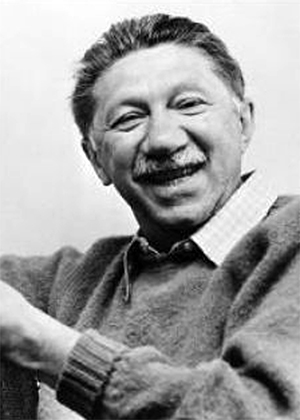
Abraham Harold Maslow (April 1, 1908 – June 8, 1970) was an American psychologist who was best known for creating Maslow's hierarchy of needs, a theory of psychological health predicated on fulfilling innate human needs in priority, culminating in self- actualization. Maslow was a psychology professor at Brandeis University, Brooklyn College, New School for Social Research and Columbia University. He stressed the importance of focusing on the positive qualities in people, as opposed to treating them as a "bag of symptoms." (Click here for full Wikipedia article)
-----
A first-rate soup is more creative than a second-rate painting.
A musician must make music, an artist must paint, a poet must write, if he is to be ultimately at peace with himself. What a man can be, he must be. This need we call self-actualization.
But behavior in the human being is sometimes a defense, a way of concealing motives and thoughts, as language can be a way of hiding your thoughts and preventing communication.
Classic economic theory, based as it is on an inadequate theory of human motivation, could be revolutionized by accepting the reality of higher human needs, including the impulse to self actualization and the love for the highest values.
Dispassionate objectivity is itself a passion, for the real and for the truth.
Education is learning to grow, learning what to grow toward, learning what is good and bad, learning what is desirable and undesirable, learning what to choose and what not to choose.
Human beings seem to be far more autonomous and self-governed than modern psychological theory allows for.
I suppose it is tempting, if the only tool you have is a hammer, to treat everything as if it were a nail.
If I were dropped out of a plane into the ocean and told the nearest land was a thousand miles away, I'd still swim. And I'd despise the one who gave up.
If swindling pays, then it will not stop. The definition of the good society is one in which virtue pays. I can now add a slight variation on this; you cannot have a good society unless virtue pays.nded.
If you plan on being anything less than you are capable of being, you will probably be unhappy all the days of your life.
If you tell me you have a personality problem, I am not certain until I know you better whether to say "Good" or "I'm sorry". It depends on the reasons. And these, it seems, may be bad reasons, or they may be good reasons.
Laugh at what you hold sacred, and still hold it sacred.
One can choose to go back toward safety or forward toward growth. Growth must be chosen again and again; fear must be overcome again and again.
One of the goals of education should be to teach that life is precious.
One's only rival is one's own potentialities. One's only failure is failing to live up to one's own possibilities.
Personality problems may sometimes be loud protests against the crushing of one's psychological bones, of one's true inner nature.
Secrecy, censorship, dishonesty, and blocking of communication threaten all the basic needs.
The ability to be in the present moment is a major component of mental wellness.
The best product should be bought, the best man should be rewarded more. Interfering factors which befuddle this triumph of virtue, justice, truth, and efficiency, etc., should be kept to an absolute minimum or should approach zero as a limit.
The fact is that people are good, Give people affection and security, and they will give affection and be secure in their feelings and their behavior.
The good or healthy society would then be defined as one that permitted people's highest purposes to emerge by satisfying all their basic needs.
The story of the human race is the story of men and women selling themselves short.
The study of crippled, stunted, immature, and unhealthy specimens can yield only a cripple psychology and a cripple philosophy. The study of self-actualizing people must be the basis for a more universal science of psychology.
We fear to know the fearsome and unsavory aspects of ourselves, but we fear even more to know the godlike in ourselves.
We may define therapy as a search for value.
What is necessary to change a person is to change his awareness of himself.
You will either step forward into growth, or you will step backward into safety.
-----
(April 1 is also the birthday of Otto von Bismarck.)
Categories: Abraham Maslow, Quotes of the day
Home KGB on Bluesky KGB on Substack
KGB Stuff Commentwear E-Mail KGB
Donate via PayPal

















